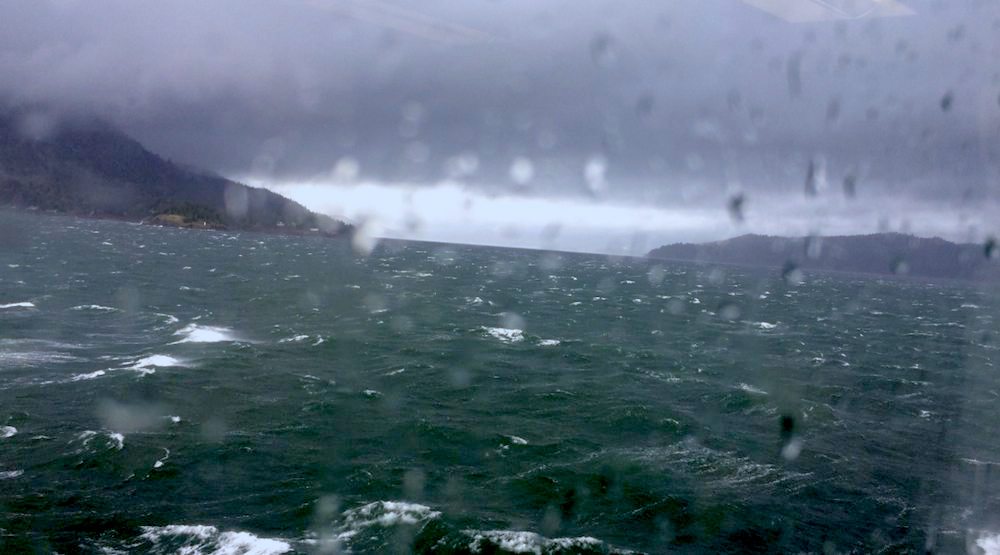
Hi Dr. Wible, I’m a current student at Ross University School of Medicine (which was located once on the island of Dominica) so we were in Dominica when Hurricane Maria Category 5 swept through and devastated the island. The hurricane was September 18, a Monday night, and Dominica lost power, running water, the roofs of homes. We woke up to what looked like the end of the world. No leaves on trees, power lines on the street, debris everywhere, doors scattered throughout, our school was destroyed for the most part.
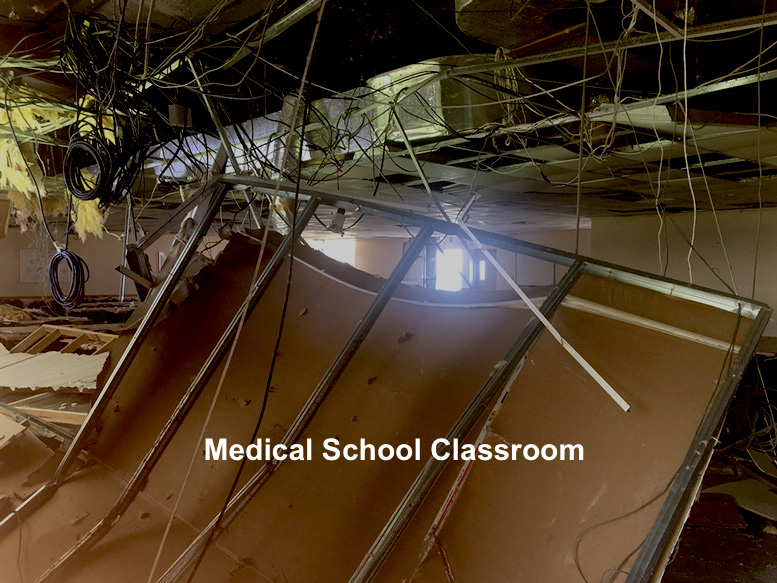
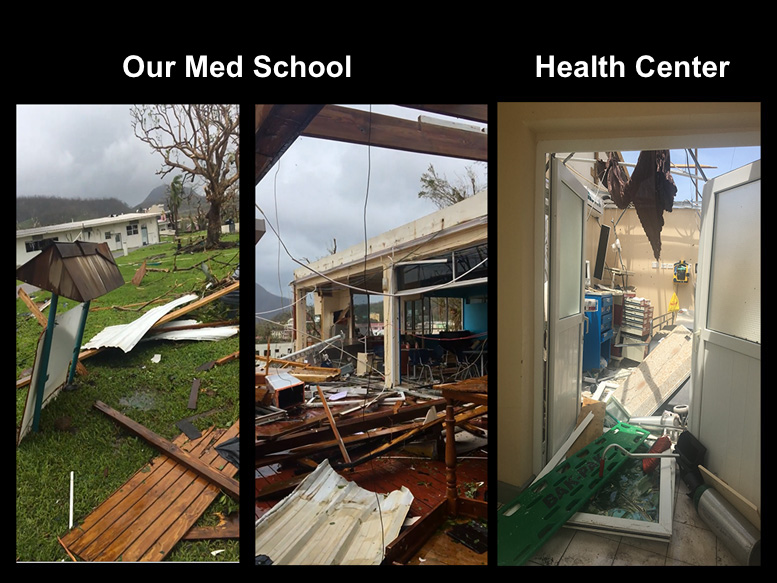
It was chaotic but I found relief with my friends. We stayed focused, looking for a reliable water source to fill up our empty gallon jugs with. We needed water for washing our hands, washing ourselves, and for “flush water” (a few gallons per 1 flush for the toilet).
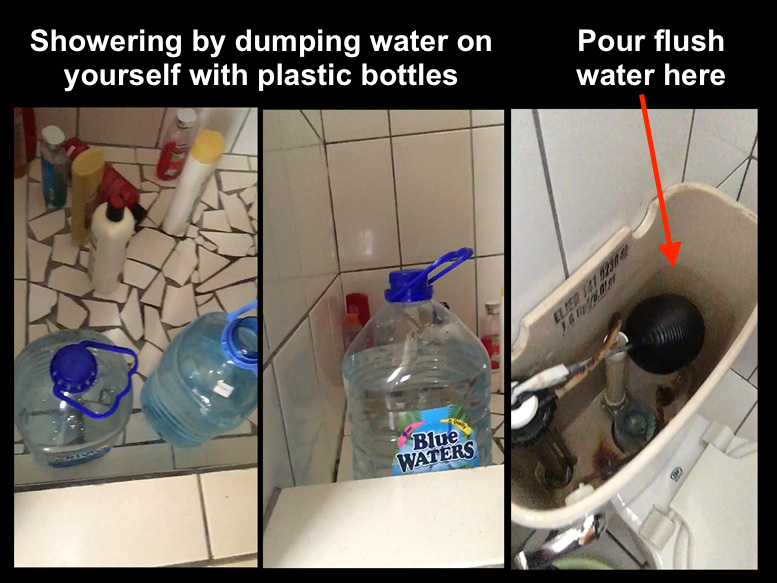
Dominica is a humid island. So without air conditioning or showers, everywhere smelled really bad. We were dehydrated and sweating more than we were drinking water, and our urine smelled. Trash was burning, people were doing their laundry in the river, there was a curfew for 4 pm because of the looters roaming around with guns, crossbows and knives. It was pure survival mode: for med students, professors, deans, admin, local Dominicans, and even the Prime Minister of Dominica, who lost the roof of his house. Professors lost the roofs of their homes—some of them were alone during that trauma. Students lost their roofs but most were sheltered on campus. One girl broke her clavicle from the roof caving in, and there were other minor injuries. One pregnant woman got medically evacuated by helicopter.
Luckily, my apartment just had some flooding. Roof was intact.
I was grateful to my landlord, who, even though he had lost everything—his home was gone—he still had his apartment building which we lived at, where he and his family stayed for shelter, and he did his best to make sure the generator was working. So by Friday, we were able to shower again. And I took a long shower that day and broke down, finally, after spending the week coping with my friends by laughing and sticking to survival protocol: find water sources to fill up the bottles, make sure we are rationing the food, joke about how insane this is, etc.
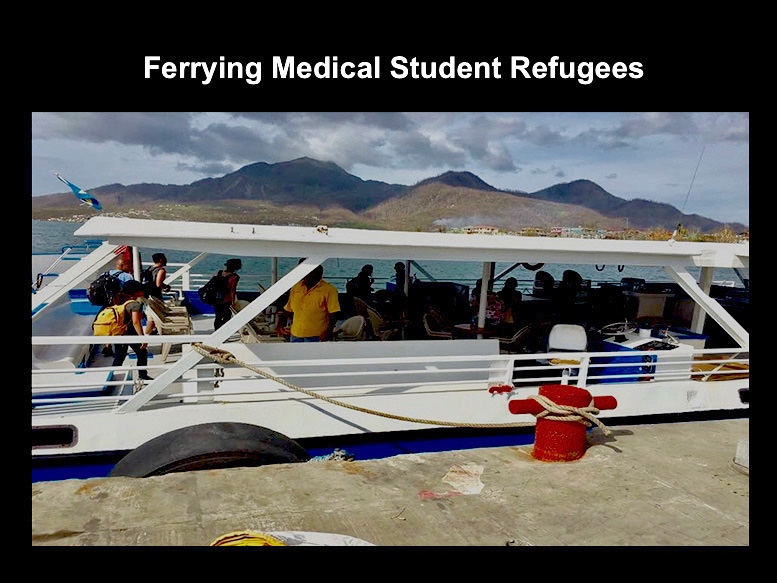
We got evacuated by ferry boats and cruise ships and anything that was available—evacuated to St Lucia at first. My evacuation group had about 40 people and we were on a small boat (the touristy type of boat that you spend an hour max on). Well, generally a ferry boat ride takes 3 hours to St Lucia, but it took 14 hours because of the debris in the water. We kept hitting it so we had to go slow. It was a very tumultuous journey. Once in St Lucia, the school put us in a hotel and we all cried with happiness from the buffet and the food and ate as much as we could… Then, the school put us on a charter plane to Miami and encouraged us to go home and bond with our families.
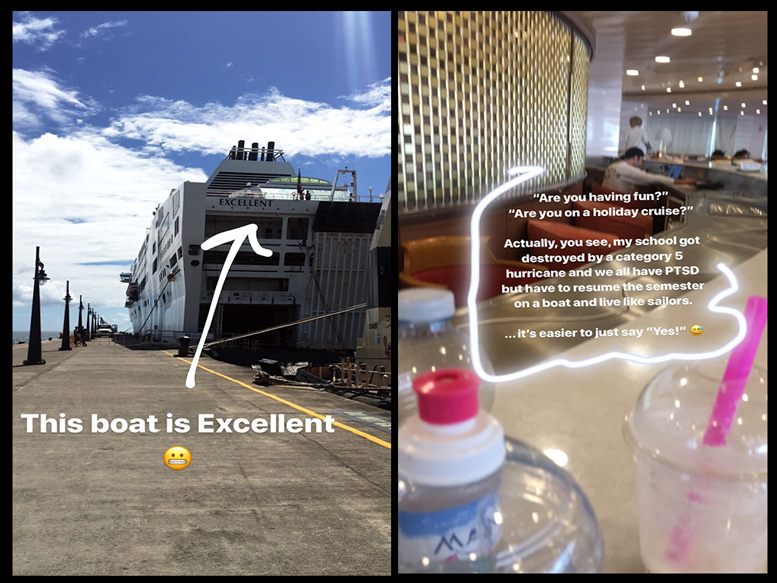
So, we had a few weeks to debrief. And then the school decided to resume the semester on a boat, and many students opted out. But the ones who stayed, like me, are experiencing quite the journey. Med school on a boat, semester at sea. We have roommates. There is no privacy.
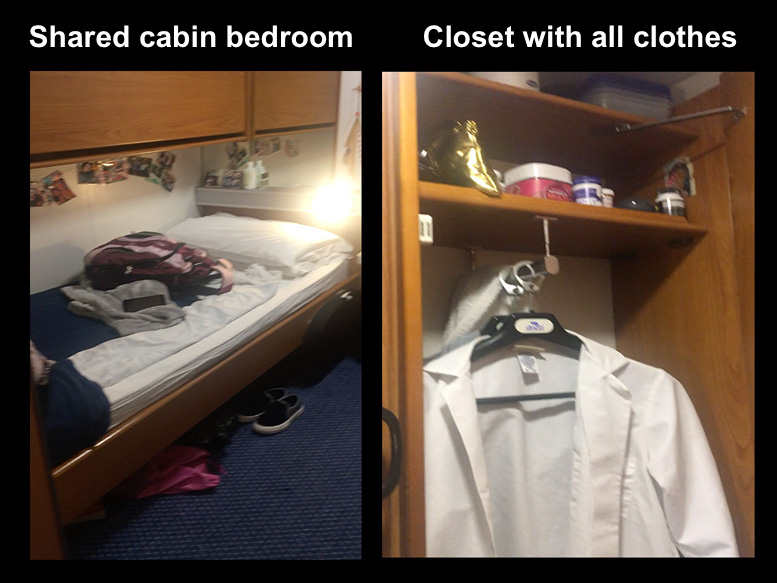
The professors also don’t have privacy because they all share on “office” and don’t get their own bathrooms, and they have to be on the boat at 4 am every day, so they come sleep deprived, and are also very vocal about how traumatic this experience continues to be. We are docked at a port in St. Kitts and are sometimes anchored out at sea all day, to allow room for the cruise ships coming in, so we are “trapped” on the boat until we get to dock. The wifi doesn’t always work. And we still take exams and study, albeit not in the most conducive conditions. But we are trying…
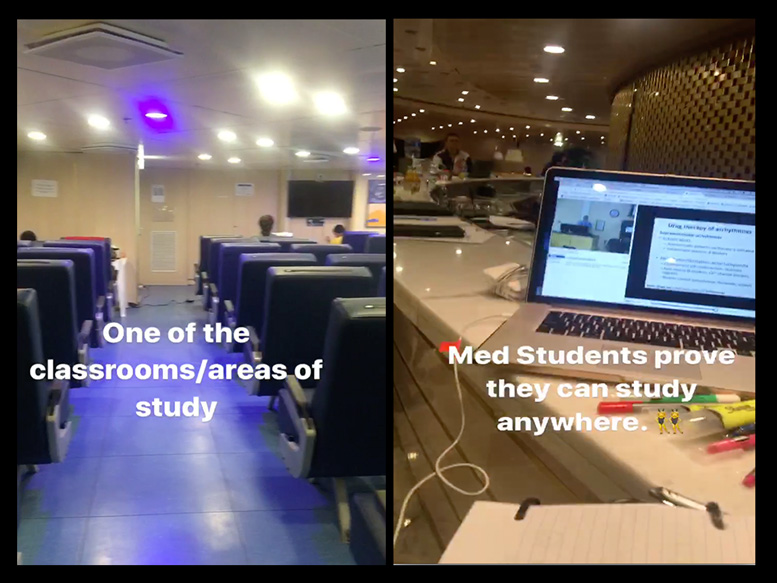
But I am wondering how this is going to affect us in the future. I’m ready to throw in the towel. Feeling like I chose the wrong path (how could I not?).
So, I just wanted to share a little snippet of a really crazy situation that I’m still processing. But I know that you would appreciate this unique story. All the professors, students and administration are looking forward to being done with the semester on January 4. We will get relocated to Knoxville, Tennessee, for next semester, luckily. So, here’s hoping this semester goes smoothly, academically speaking, so that these experiences will have at least been worth it!!
Warm regards,
Melissa
~ ~ ~
Wow Melissa!
You are a total survivor! I’m amazed. You’re so dedicated to your medical education that you rode out a Category 5 hurricane with sustained winds of 160 mph, floods, landslides, and total devastation to the entire country that left many dead.
You lost your medical school, all communication with the outside world, even access to drinking water. You wandered around dehydrated. You rationed food. You witnessed violence, looting, and the mass exodus of your classmates. Yet you remained.
You are obviously determined to complete your training. Trapped on a boat. Without privacy. And still passing your tests!
Your strength has come from helping one another in community, huddling together with your classmates, staying in close contact with your professors (since you can’t escape the boat). Catastrophes bring out the best and worst in people. Yet ultimately everyone becomes closer. Disasters tend to tear down hierarchy. To survive we depend on human kindness. People are more real, vulnerable, honest about how they feel. Mental and physical health issues surface and you must be there to attend to each others needs without infrastructure. And you did it!
How will this impact you in the future? You won’t ever need to attend a resiliency class. Trust me. And residency should be so much easier than this!
If you need to talk, I’m always here . . .
So proud of you!
~ Pamela
Do you have advice for Melissa? Please leave your words of wisdom below. She (& her classmates) are reading all your comments for support.














A good friend’s daughter was just accepted to Ross yesterday. I hope they will be ok for fall 2018. Thoughts???
Take care
Ooooh! I just don’t know how long it will take to rebuild.
CRAZY!!
I am a Ross graduate. They expect the be back on the island by summer session. No later than Fall
‘case U didn’t know, Herbalist Matthew Wood’s newest book Earthwise Repertory has a thorough section on PTSD & related states of mind. “Botanical medicine is the kind your body recognizes.” James Duke PhD
I wanted to let Melissa to know she can reach out to me if she would like. I graduated from Ross in 2000, and my first semester in 1995 survived 3 Grade 5 Hurricanes and 1 tropical storm. My friends roof got blown off, and we had to endure many of same things Melissa described. The campus was destroyed, but not nearly as bad as it was this year, from seeing the pictures and reading the article. Let her know, 17 years later I’m a successful family physician and part of a really cool student/doc podcast/website/network (www.thehappydoc.com). My best advice is: keep grinding because it’s worth it. It’s a lesson you will need throughout your medical training and career: What kind of character do you have when things don’t go your way and who will you be as a person and healer when the s@#$ hits the fan? Don’t ever give up Melissa. This is your calling and you are answering it. You got this. Thoughts are with the students, faculty, citizens there.
I’m here if she needs someone to correspond with, if she needs someone to connect with – either here on Facebook, Twitter (@drneel1973) or email.
Neel Desai, M.D.
RUSOM Class of 2000
SO inspiring and thanks so much Neel. Great advice! Amazing how you prevailed.
I was also there in 1995! Those 20 months were really something. The campus has changed quite dramatically since then.
Aimee Barton, MD
Class of 1999
I am a current student at RUSM. This is a lie. There were no category 5 hurricanes in Dominica in 1995.
I was in Guadalajara Jalisco Mexico when Ross opened its doors in 1978.
Its intention was not to last these (nearly) 40 years. Throughout the ’70s
and still there are articles about gluts and distributions of physicians in USA,
the Untied Stakes of Anemia. a couple/few years ago I met a DC with 20+y
practice who had gone Caribbean and was trying to find an allopathic internship to
no avail. very chancy going abroad as the medical education bottleneck
is the number of training positions open presently very near parity just USMGs.
I hope Melissa below has a fall-back plan. Not to be unreasonable, if this is what
Melissa et al think they want, then I would suggest find mentors in the profession
and all the patient clinical exposure possible, know you have no idea what is ahead
and what the stressors are, and have an escape mechanism, a solid manner daily of
relieving those massive stressors. Most employ exercise and physical activity while some
read or bake. Whatever. And know this, the shit flows downhill and no one will warn you.
If you are fortunate, then someone will reach out to you to acknowledge you so just hang on as you are doing well and it will get smoother. Do not lose sight of your humanity.
Thanks Donald. Sage advice.
I got my first choice residency and first choice fellowship. I direct a NICU. I know LOTs of Ross graduates who have done very well for themselves. It is very possible to do if you persevere!
I’m also a Ross grad, from 2015. I survived some pretty horrific stuff during my medical school…not directly on the island like you did Melissa, but I suffered a brain injury at the end of my 4th year that left me unable to speak for a while and took a lot of rehab to get back on my feet. I had a lot of thoughts of “how can I keep doing this”, “is it worth it”, and “did I choose wrong”…And I can tell you, if you kept going this far, it’s worth it, you can do it, and you didn’t choose wrong. If you need anything from me, advice, to talk, to rant…let me know! We’re a family here for each other. Ross resilience is what we’re known for!
I’ll forward your email to Melissa. Thanks so much Serena. Love seeing how all the Ross grads are chiming in here.
Reason number 896 to go to a real medical school and not one in the carribean